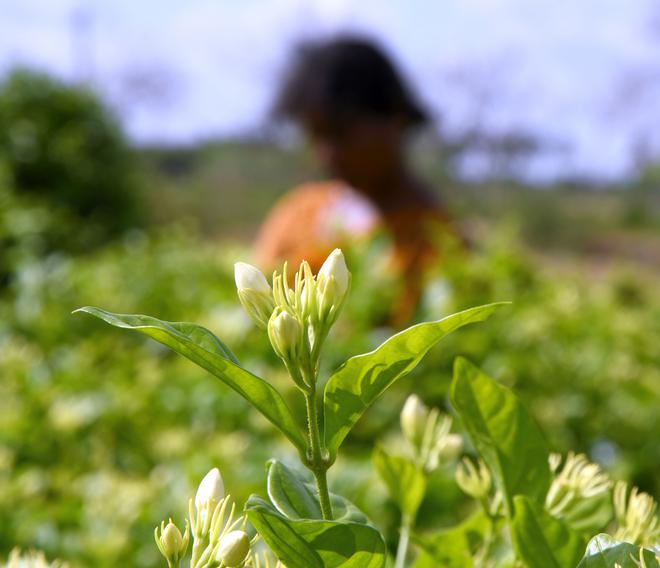We first hear the tinkle of glass bangles. And then it hits us: the overpowering scent of jasmine. About 30 women are stringing the flowers inside a nondescript building in a bylane in Nilakottai, Dindigul district, 45 kilometres from Madurai. Songs from a mobile phone play in the background as their fingers work swiftly. Each of them is seated in front of small heaps of flowers — they can string half a kilogram in under one hour. Outside, two groups of men string garlands. Polystyrene boxes wait nearby, into which the garlands and jasmine strands will be packed with ice.
They will then be sent to Singapore, the US, UAE (Dubai) and Malaysia. An urgency creeps in as afternoon nears and the consignment has to be readied for the first leg of its journey by road: this is just another day in the many small packaging units of export companies that dot Nilakottai.
S Lokesh, whose father SM Sivakumar owns SMS Exports, is overseeing work at their unit. “We buy flowers from the market here at 6.30am every day. To tie them, we employ women from surrounding villages who are skilled in the craft,” he adds. The companies function out of buildings on the outskirts, many of which operate based on orders for the day. Nilakottai’s flower market is among the jasmine hubs in the region, apart from Madurai, Usilampatti, and Aruppukottai. Farmers from villages nearby bring their flowers to sell at the town’s market that steadily supplies customers across the world.

What sets these units apart is that they are powered entirely by women from the region. S Alaguthai from Vilampatti, C Renuka from Silukuvarpatti, V Sudha from Pillayarnatham... all of them start from home in buses and mini-buses to arrive at work at 8am. The atmosphere is relaxed: they chat, share jokes, listen to music. Their fingers all the while work deftly to ready the evening’s consignment. “Most people from my village are engaged in work related to flowers,” explains Alaguthai. “They either string flowers at home to sell in the neighbourhood, pick flowers for farmers, or come to work at the export units,” adds the 67-year-old.
Where did she learn to string flowers? “No one teaches you these things,” Alaguthai chuckles. “You just pick it up.” A few blocks away, another team of women is stringing flowers to be sent to a wedding decorator in Saudi Arabia. Here, they use needles instead of tying flowers by hand with thread. “This is based on customer specifications,” says P Sudha, the supervisor, who walks around the hall, giving instructions and collecting the finished pieces.
According to N Jegatheesan, president, Tamil Nadu Chamber of Commerce and Industry, Madurai, Nilakottai has 25 such units sending flowers abroad. “Most of them ship under the names of three export companies who hold a valid export license,” he explains. Jegatheesan’s company, SN Flowers and Exports, has a packaging unit in the town. “We work based on order, and most customers give us specific measurements,” he points out. “For instance, they ask for rolls with strands of 1.25 metres each or 2.25 metres each, which we get done.”
Once ready, the flowers are rolled in butter paper or aluminium foil, and packed with ice gel. “They can remain fresh for up to 35 hours,” Jegatheesan points out. Then, their journey begins. “We send them through airports at Madurai, Tiruchi, Chennai, Kochi and Thiruvananthapuram,” he says, adding that he ships to 12 countries, including Canada, the UK, and UAE. “We have vendors in these places who place orders with us; they in turn supply their customers. These include temples such as the Meenakshi temple in Houston and the Balaji temple in Pittsburgh,” he adds.
Flowers drive the economy of this small town. “Farmers from 300 villages bring flowers to sell at our market,” says S Paneerselvam, who is stringing a sampangi garland at a stall in the market one afternoon. “Malli, mullai, jaadhi malli, sampangi…you name it. They grow a wide variety in the fields that surround us.” According to data from the Department of Horticulture, Dindigul, Nilakottai and its surrounding villages grow jasmine across 701 hectares, with around 1,750 farmers involved in the cultivation of the flower. Dindigul district exports 500 to 1,000 kilograms of flowers a day during the peak season from April to June.
Paneerselvam says credit should be given to the locals’ skills as well. “We are good at creating exactly what the customer asks for,” he says, pointing to an ornate rose garland his colleague is working on. Each strand being exported has to look similar, which the women achieve with ease. A Jothi, who works at SMS Exports says with a chuckle: “I don’t think I can ever go to America. But I’m happy that the jasmine I string does.”







